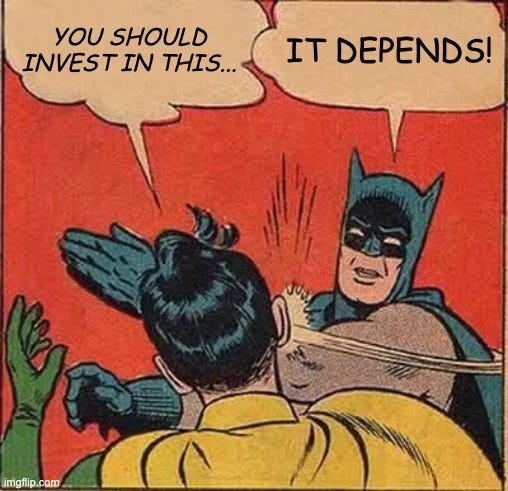To support the publication and receive new articles directly to your inbox, please subscribe:
We don't say, ‘Be careful’.
When it involves jumping off a mountain on a motorcycle, we're way past careful.
What matters in situations like this is extreme competence.
Christopher McQuarrie (Director of Mission Impossible)
Don’t be careful
Being careful with your finances is risky business.
Why?
Because inflation doesn’t care about you or your innate desire for safety.
Inflation isn’t cautious.
It’s aggressive.
It’s a merciless destroyer of financial futures.
It’s also, crafty.
If you leave your money in the bank it won’t decrease in value, it may even earn a bit of interest, so it seems safe.
But inflation doesn’t care about the numerical value of your bank account.
It only cares about one thing.
Power.
Purchasing power.
So whilst you may keep £10,000 in a bank account for 10 years, that £10,000 (+ interest) will buy you less in the future than if you’d spent it 10 years ago.
The value hasn’t changed, but its purchasing power has… massively.
Like a tree rotting from the inside, inflation hollows out our money.
Number Crunching - Cash
Hopefully, it’s clear that you need to do something to combat the corrosive effects of inflation.
You may think to ‘play it safe’ and use a term-based savings account to guarantee an interest rate.
So, lets look at savings rates v.s. inflation over a 20-year time period:
Blue line = 90-day savings account rate.
Red line = Inflation (CPI).
Red line higher than blue line = very bad.
A 90-day savings account provided a nominal return* of 39.75% over the 20 years.
The real return** was minus 34.10%.
*Nominal return = not accounting for inflation.
**Real return = after deducting inflation (the one that matters).
What does that look like on a £10,000 deposit?
If you only considered the nominal return, you may’ve been pleased with your prudent life choices; however, nominal returns don’t put food on the table - they’re an illusion.
Once you look past the mirage of a double digit nominal return, you’ll find a ‘safe’ investment providing a negative real return…
Whilst the money did grow in value, it’s purchasing power was persistently pummelled over a 20-year period.
Purchasing power and real returns are all that matter when it comes to making competent financial decisions.
Now, shall we zoom in and look over a shorter timeframe?
Ah, Early 2020… what a time to be alive!
How did your £10,000 fair over this turbulent period?
*Gulp*
Before we move on lets quickly look at the same timeframe, but with an amount of money that requires you to ‘be careful’…
I’m sorry to report that whilst you kept the capital value safe, you neglected the single most important aspect of your money… it’s purchasing power!
When people speak of not wanting to lose their money, which is understandable, what they should really be thinking about is not losing the future purchasing power of their money.
If you aren’t spending the money today, then that money is purely future purchasing power.
It’s retained energy which can be utilised at a later date.
And if you don’t manage it properly, you’ll have less energy to call upon when you actually need it!
Number Crunching - Investing
Ok, we’re on a roll!
Lets see how an investment in the stock market did over the same 20-year period:
Nominal return = 240.53%
Real return = 166.68%
(Side note, I picked a random FTSE 100 fund that was available back in 2004, so investment costs and tracking error were accounted for… the HSBC American fund returned 745.70% (nominal) over the same period, but I thought I’d keep it UK-focused, as investing globally is a relatively new concept in the UK).
Same process:
£10,000 deposited in 2004 had its purchasing power eroded down to £6,590.
£10,000 invested in 2004 more than doubles its purchasing power!
Now, which one was the riskier investment?
The 90-day cash savings account or the FTSE 100 fund?
Careful approach = a negative real return, forsaking future purchasing power for the illusion of safety.
Competent approach = more than doubling the purchasing power of your money.
Imagine the range of opportunities for the person who invested their money rather than saved it.
Think of all the lost opportunities for the person who chose the savings account instead of investing, to ‘play it safe’…
Just for fun, lets imagine you had the good fortune to invest £250,000 in HSBC’s American fund in 2004, within a tax-efficient account, and never sold…
Capitalism + compound interest really is a beautiful thing 🤌
Disclaimer
To be clear, cash has its place in everyone’s financial plan.
Any money needed in the short-term (3-5 years), you probably want to leave in cash.
You also don’t want to be investing your emergency fund (3-12 months of living expenses, incase the proverbial shit hits the fan!).
Short-term = cash is king.
Long-term = cash is trash.
Be Competent
It’s time to channel your inner Tom Cruise…
To be competent is to be capable. To have sufficient understanding, knowledge, and confidence to perform a specific task.
Being careful with your money may sound sensible, but as we’ve seen, you may well be doing yourself financial harm in the long run!
Learn the fundamentals and take thoughtful and deliberate actions.
Remember, Purchasing power and real returns are at the core of making competent, long-term financial decisions.
If in doubt, seek help from a (competent) professional.
Further Reading
For further thought on making financial decisions, check out these articles:
It Depends...
The internet and, more worryingly, our legacy media are awash with ‘financial advice’. We have masses of unqualified/misinformed people spouting about what other people should do with their money. Whilst some of this ‘advice’ may be sensible, it is often portrayed in absolute terms.
The Fence
Have you ever seen/heard something and immediately decided it was stupid? So stupid that you felt compelled to do something about it? Maybe a process at work or how a friend does something… “Who could’ve thought this was a good idea?!” I have. A lot.
If you enjoyed the article, please consider sharing it with someone else who’d also enjoy it or more widely on social media, it really helps:
Oh, and don’t forget to subscribe, so you can get future articles directly to your inbox!
Thanks for reading,
Tom Redmayne
Cambridge-Based Financial Planner
The value of investments can go down in value as well as up, so you could get back less than you invest. It is therefore important that you understand the risks and commitments.
This is not personal advice based on your circumstances.
All views are my own.
















I have forwarded this onto my partner who is obsessed with holding savings in cash.
Nice one Tom.